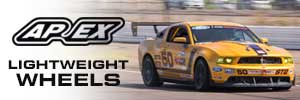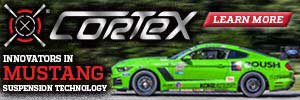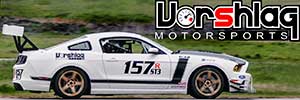- 6,400
- 8,291
Original Article by Jack Baruth:
Don't Touch That Button: Turning Off Stability Control Is Dumb and Dangerous
I don't track this number quite as obsessively as I do my total number of races or different racetracks driven, but after some late-night spread-sheeting, I'm reasonably certain that I've now coached over 500 novice drivers on a racetrack of some sort. This year I'm not planning on doing a lot of driver coaching, so I'll maybe add 15 or 20 names to that list.
Every true novice is different, of course, but you'd be surprised at how many incorrect expectations, preconceptions, and habits they share. Maybe one out of 20 can execute anything like a proper heel-and-toe downshift. A disturbing percentage, let's say about half, need to be reminded to brake at the end of VIR's long straightaway, which is approached at speeds of up to 185 mph depending on the car they've brought with them. Otherwise, they will drive right off the end of the track and down the long grassy hill known as the "Roller Coaster."
Last but certainly not least, we have the Disengagers Of The Stability Control. These fellows will surreptitiously turn off ESC/DSC/whatever the maker calls it before I get in the car with them. More than three-quarters of my absolute first-timer students do it. It's gotten to be such a universal habit that I now actively check to ensure that stability control is fully activated before I will pull out of pit lane with a student, each and every time, whether it's our first lap together or our thousandth.
It's a puzzler: If you are going out onto a racetrack as a driver for the first time in your entire life, driving your own car for which you are financially responsible, and risking your own neck for which you are entirely responsible, why the hell would you turn off a system that is designed to prevent you from spinning the car and causing all sorts of mayhem? When I went on my first (and last) skydive, I didn't see anybody ostentatiously throwing their reserve chutes in the garbage. When I went zip-lining, I didn't see anybody who refused to clip on their second carabineer to the steel cable. So why are so many drivers obsessed with disengaging stability control?
After considerable reflection, I've decided that it's probably due to misinformation, ignorance, and pride, in about equal measures. Let's call them the Three Horsemen Of The First-Time Trackday Apocalypse, as experienced by many a BMW M-car or Corvette driver. The first horseman, Misinformation, is the fault of my colleagues in the autojourno business.
There's a standard trope in automotive journalism that goes something like this: "The Gargantua Bilgebeast 3.7 LX understeers heavily on fast back roads, but turning off ESC allows you to balance the handling with a whiff of throttle, exiting the corners with just a dash of opposite lock and two smoking rear tires." These lines are almost without exception penned by people whose closest exposure to the fabled "limit" has been watching an F1 race on television.
I've sat next to these sorts on many a press drive. Some of them write for well-regarded publications. Sometimes even the celebrated and infallible British rags. Time and again I've watched them enter a turn far too fast, brake and steer at the same time, overwhelm the front tires, and mess up the balance of the car to the point that the ESC light flashes like a Morse code device in the hands of Eddie Van Halen. At that point, the hard work of all the development engineers at the car's manufacturer comes into play, the computer sorts things out, the car exits the turn slow but straight, and the person behind the wheel starts griping about "understeer"—little knowing how close he came to cashing both of our checks through sheer idiocy.
If you're flashing the ESC light on a public road, you are doing something that is extremely risky, extremely stupid, extremely incompetent, or possibly all of the above. Don't do it. Yes, I will admit to a few afternoons where I drove a mostly empty mountain road like it was Laguna Seca, complete with tire spin on the exits. I don't advocate it, and I'm not proud of myself for having done it. That sort of behavior is best saved for the racetrack.
Yet even on the racetrack, ESC has a place, and that's where the second horseman, Ignorance, comes in. Most of my novices think that ESC will "ruin their fun" or "shut them down." The fact is that you can get most cars to within two or three seconds of their best lap time with all the systems turned on. For reference, the average novice track rat is 30 seconds a lap or more off the pace, and the average "black group advanced" driver with 50 weekends under his belt is three to five seconds off the pace.
It's true that some of the very early traction and stability controls, like the ASC+T fitted to Nineties Bimmers, can be a bit overactive and kludgy. They're the exception, however, and most modern cars are very smart when it comes to keeping the car on the straight and narrow. Many of the newer performance cars, going all the way back to the C5 Corvette, can recognize the signs of track use and loosen the reins a bit. They also often have a competition or track mode.
I don't let my novices use those modes, however, because they are designed for drivers who know what they are doing. That's where Ego, the third horseman, comes into play. None of us like to admit that we could use some improvement as drivers—even if we're attending driver training! But the truth is that even the best drivers can make some mistakes. When I'm driving a street car on a wet racetrack, I typically leave all systems on. Why? Well, I've had to drive thousands of wet laps in race cars that didn't even have ABS, and I'm pathetically grateful for a system that keeps me from having to use a feather touch on the accelerator at the exit of 12 turns every minute and a half. Why take unnecessary chances for no additional fun?
Stability control doesn't get tired. It doesn't get distracted thinking about the next lap or the day job or the girlfriend or the after-trackday dinner. It doesn't get freaked-out by a car sliding in front of it, and it doesn't misjudge available traction because it failed to see a bit of water shine on a corner entrance. Consider the following: Formula One drivers are the best drivers in the world (save it, NASCAR and rally fans, you know I'm right) and yet the race teams used to move heaven and earth to install secret traction control systems to help them. If Michael Schumacher or Lewis Hamilton can benefit from a little computer intervention, so can you.
When I see my students have deactivated stability control, I ask them to turn it back on, and I explain how and why it helps them. I tell them that the day will come when they can drive a car with no computer help at all, like a Spec Miata, on a racetrack, and that on that day they'll wish they had some of that intervention back. I explain that you can actually go faster by using the ESC warning light to train yourself. When you see it flash, ask yourself what you did to upset the car's balance, and fix it the next time.
Most of them are willing to do as I ask. The ones that aren't? Well, they have to sit out the session until another instructor is willing to take my place. There's enough risk in this trackday hobby without introducing unknown factors to make it worse.
I suppose I should end with a cautionary tale. I had a student once, a really quick kid. Over the course of a few years he got to the point where he could drive very powerful cars very close to their limit. He was usually within a few seconds of me. Last month, while I was riding Razor scooters in the cul-de-sac with my son, I got a call from him. He'd made a mistake on-track. A big mistake. Totaled a $50,000 car, the one that he uses to get to work. When I pressed him on the circumstances, he admitted that he'd turned ESC off to save a half second from his lap time. His crash, a flat spin that put his car into the concrete barrier backwards, might have been prevented by ESC. This kid has talent. He has guts. And now he has a concussion that doesn't seem to want to go away. He can live with his mistake, if it helps others. Be smart. Don't touch that button.
Don't Touch That Button: Turning Off Stability Control Is Dumb and Dangerous
I don't track this number quite as obsessively as I do my total number of races or different racetracks driven, but after some late-night spread-sheeting, I'm reasonably certain that I've now coached over 500 novice drivers on a racetrack of some sort. This year I'm not planning on doing a lot of driver coaching, so I'll maybe add 15 or 20 names to that list.
Every true novice is different, of course, but you'd be surprised at how many incorrect expectations, preconceptions, and habits they share. Maybe one out of 20 can execute anything like a proper heel-and-toe downshift. A disturbing percentage, let's say about half, need to be reminded to brake at the end of VIR's long straightaway, which is approached at speeds of up to 185 mph depending on the car they've brought with them. Otherwise, they will drive right off the end of the track and down the long grassy hill known as the "Roller Coaster."
Last but certainly not least, we have the Disengagers Of The Stability Control. These fellows will surreptitiously turn off ESC/DSC/whatever the maker calls it before I get in the car with them. More than three-quarters of my absolute first-timer students do it. It's gotten to be such a universal habit that I now actively check to ensure that stability control is fully activated before I will pull out of pit lane with a student, each and every time, whether it's our first lap together or our thousandth.
It's a puzzler: If you are going out onto a racetrack as a driver for the first time in your entire life, driving your own car for which you are financially responsible, and risking your own neck for which you are entirely responsible, why the hell would you turn off a system that is designed to prevent you from spinning the car and causing all sorts of mayhem? When I went on my first (and last) skydive, I didn't see anybody ostentatiously throwing their reserve chutes in the garbage. When I went zip-lining, I didn't see anybody who refused to clip on their second carabineer to the steel cable. So why are so many drivers obsessed with disengaging stability control?
After considerable reflection, I've decided that it's probably due to misinformation, ignorance, and pride, in about equal measures. Let's call them the Three Horsemen Of The First-Time Trackday Apocalypse, as experienced by many a BMW M-car or Corvette driver. The first horseman, Misinformation, is the fault of my colleagues in the autojourno business.
There's a standard trope in automotive journalism that goes something like this: "The Gargantua Bilgebeast 3.7 LX understeers heavily on fast back roads, but turning off ESC allows you to balance the handling with a whiff of throttle, exiting the corners with just a dash of opposite lock and two smoking rear tires." These lines are almost without exception penned by people whose closest exposure to the fabled "limit" has been watching an F1 race on television.
I've sat next to these sorts on many a press drive. Some of them write for well-regarded publications. Sometimes even the celebrated and infallible British rags. Time and again I've watched them enter a turn far too fast, brake and steer at the same time, overwhelm the front tires, and mess up the balance of the car to the point that the ESC light flashes like a Morse code device in the hands of Eddie Van Halen. At that point, the hard work of all the development engineers at the car's manufacturer comes into play, the computer sorts things out, the car exits the turn slow but straight, and the person behind the wheel starts griping about "understeer"—little knowing how close he came to cashing both of our checks through sheer idiocy.
If you're flashing the ESC light on a public road, you are doing something that is extremely risky, extremely stupid, extremely incompetent, or possibly all of the above. Don't do it. Yes, I will admit to a few afternoons where I drove a mostly empty mountain road like it was Laguna Seca, complete with tire spin on the exits. I don't advocate it, and I'm not proud of myself for having done it. That sort of behavior is best saved for the racetrack.
Yet even on the racetrack, ESC has a place, and that's where the second horseman, Ignorance, comes in. Most of my novices think that ESC will "ruin their fun" or "shut them down." The fact is that you can get most cars to within two or three seconds of their best lap time with all the systems turned on. For reference, the average novice track rat is 30 seconds a lap or more off the pace, and the average "black group advanced" driver with 50 weekends under his belt is three to five seconds off the pace.
It's true that some of the very early traction and stability controls, like the ASC+T fitted to Nineties Bimmers, can be a bit overactive and kludgy. They're the exception, however, and most modern cars are very smart when it comes to keeping the car on the straight and narrow. Many of the newer performance cars, going all the way back to the C5 Corvette, can recognize the signs of track use and loosen the reins a bit. They also often have a competition or track mode.
I don't let my novices use those modes, however, because they are designed for drivers who know what they are doing. That's where Ego, the third horseman, comes into play. None of us like to admit that we could use some improvement as drivers—even if we're attending driver training! But the truth is that even the best drivers can make some mistakes. When I'm driving a street car on a wet racetrack, I typically leave all systems on. Why? Well, I've had to drive thousands of wet laps in race cars that didn't even have ABS, and I'm pathetically grateful for a system that keeps me from having to use a feather touch on the accelerator at the exit of 12 turns every minute and a half. Why take unnecessary chances for no additional fun?
Stability control doesn't get tired. It doesn't get distracted thinking about the next lap or the day job or the girlfriend or the after-trackday dinner. It doesn't get freaked-out by a car sliding in front of it, and it doesn't misjudge available traction because it failed to see a bit of water shine on a corner entrance. Consider the following: Formula One drivers are the best drivers in the world (save it, NASCAR and rally fans, you know I'm right) and yet the race teams used to move heaven and earth to install secret traction control systems to help them. If Michael Schumacher or Lewis Hamilton can benefit from a little computer intervention, so can you.
When I see my students have deactivated stability control, I ask them to turn it back on, and I explain how and why it helps them. I tell them that the day will come when they can drive a car with no computer help at all, like a Spec Miata, on a racetrack, and that on that day they'll wish they had some of that intervention back. I explain that you can actually go faster by using the ESC warning light to train yourself. When you see it flash, ask yourself what you did to upset the car's balance, and fix it the next time.
Most of them are willing to do as I ask. The ones that aren't? Well, they have to sit out the session until another instructor is willing to take my place. There's enough risk in this trackday hobby without introducing unknown factors to make it worse.
I suppose I should end with a cautionary tale. I had a student once, a really quick kid. Over the course of a few years he got to the point where he could drive very powerful cars very close to their limit. He was usually within a few seconds of me. Last month, while I was riding Razor scooters in the cul-de-sac with my son, I got a call from him. He'd made a mistake on-track. A big mistake. Totaled a $50,000 car, the one that he uses to get to work. When I pressed him on the circumstances, he admitted that he'd turned ESC off to save a half second from his lap time. His crash, a flat spin that put his car into the concrete barrier backwards, might have been prevented by ESC. This kid has talent. He has guts. And now he has a concussion that doesn't seem to want to go away. He can live with his mistake, if it helps others. Be smart. Don't touch that button.













